The memory returns to me so vividly I feel I am back there, at 14, in the backseat of that taxi. At the time my father had been dead for 18 months, my mother had vanished the year before that, I was magically sprouting hair in places I was not expecting, and I was still sharing a bed with Teta.
I was returning from a history lesson at Maj’s house. We were both struggling with the material. Our school followed the British curriculum, which meant we had to study the history of Europe and the World Wars: the Kaiser, the Treaty of Versailles, then Churchill and Stalin. It all seemed like another universe to us, so Teta and Maj’s mother agreed to share the costs of a private tutor.
I hailed a taxi outside Maj’s house and got into the backseat, as Teta directed me to do when riding in taxis alone. The man behind the wheel was young, though I couldn’t make out his age: perhaps 18, maybe 20. He was wearing a tight red T-shirt that gripped his body. He drove without speaking. A familiar pressure inside me began to build. It was a terrible choking sensation that had been growing in the months since I lost my parents. I had no control over my destiny, and everything around me could suddenly die or run away.
I rolled down the window and pressed the back of my head against the leather seat. The crisp November air felt cold against my face, releasing the pressure somewhat. Through the streetlights, which lit up the inside of the car in recurring waves, I saw that the driver’s forearms were potholed with scars. I admired the way his T-shirt stretched tightly against his chest. His arms broke out in large goose bumps.
“Shut the window, it’s cold,” he said. I rolled up the window, feeling the choking sensation close in on me once more. I watched the muscles in the driver’s arms tighten as he shifted gears. The large veins running under his skin awoke a sensation inside me I had never felt before. I wanted to connect with him in some way, to be closer to him somehow.
“Is this your taxi?” I asked.
“My brother’s,” he said. His jaw clicked as he chewed a piece of gum. He sighed and put one arm behind the passenger seat while steering with the other. I looked at the hand resting behind the seat. His fingers were decorated with gold and silver rings. Dark black dirt was wedged underneath his fingernails. I glanced down at my own fingernails, which Doris had clipped earlier that day.
I tried to imagine what this man’s life was like, outside of this taxi. His rough accent meant he probably lived in al-Sharqiyeh, maybe in a tiny room that smelled of fried onions and cigarettes, because that’s what I imagined al-Sharqiyeh would smell like. How much did we have in common, he and I? If I knew then what I know now, I would have put our differences down to a complex algorithm of class and culture. But back then I did not know about any of that, so I stuck to what we had in common: the car we were both sitting in.
“Do you drive this taxi often?” I asked.
“One or two nights a week,” he replied, making a turn into the side street that took us off the highway and toward my new neighborhood downtown.
“Do you enjoy it?”
“Enjoy what?” His eyes flicked up to look at me through the rearview mirror. His eyes were a cool gray, almost silver. “Driving the taxi,” I said, holding his gaze as I played with the dog-eared corners of the history books on my lap.
“It’s just a job,” he said, turning back to the road. “Well what do you like doing when you’re not driving the taxi? Do you watch television?” Teta fed me on a diet of dubbed Mexican telenovelas, American television shows, and an endless stream of news. Perhaps his television set also showed those channels.
“I don’t have spare time. When I’m not driving, I work on a construction site.”
The next turn would take us to my street. I felt a sudden panic. I wanted to spend more time with this man. We were moving closer to something new and exciting. I wanted to be his friend. And not just any friend, not like Maj or Basma, but a friend who would always be around, someone I could hug and be close to. My insides were buzzing. I wanted him to keep on driving, to take me out of this sad town, far away from that empty apartment with Doris and Teta.
“Is that why you have big muscles?” I scrambled to find a way to delay our separation. He glanced at me, studied my face for a while, clicked his chewing gum. Then his lips turned to form a crooked smile.
“Come up here and sit next to me,” he said.
I hesitated. It would be eib to say no, although it also felt eib to say yes. Stuck between two eibs, I left the books in the back and climbed into the passenger seat. We drove past Teta’s apartment. He took a right into a dark street and parked the car between two large trees. He unzipped his jeans and pulled out his thing. It stood between us, hard, like an intruder to an intimate conversation. Instinctively, I reached out and grabbed it, and he let out a slight moan. I studied the thing in my hand, feeling it grow in my palm.
“Yalla,” he whispered as his eyes scanned the area. “Huh?”
“Put your mouth on it,” he said impatiently.
I swallowed and bent down. He smelled sour and hot. I put his thing in my mouth and looked up for further instructions.
“Wet your mouth, wet your mouth,” he hissed. “Your tongue is like sandpaper.”
I swallowed a few more times until my mouth was wet, and this time the process went more smoothly. He seemed happy with this and sighed. He pressed down on my neck but he remained alert, his head darting back and forth as if following a game of tennis. I was down for a few minutes when my excitement began to disappear, replaced with a strong sense of guilt that I was making a terrible mistake.
I struggled, concentrating on breathing through my nose and not gagging each time he pushed my head down. I wasn’t sure how long this would last. He groaned. My mouth filled with salty slime. The warm hand at the back of my neck disappeared.
“Get out now before someone sees,” he said, zipping his trousers up. I wiped my mouth, took my books from the backseat, and got out of the car. The man started up the engine, reversed out onto the road, and sped off.
I looked around. There was no one. The awkward feeling slowly disappeared, and the memory of what happened seemed sweeter. I stored bits of it for later: the warm hand on the back of my neck, the sour smell, the shape of his thing in my mouth. I relived those memories as I walked home. Teta looked up when I came through the door. I was terrified to face her. She always seemed to know everything. This was something she should never know. She was sitting in her nightgown, cracking roasted sunflower seeds between her teeth. On the television the news showed footage of bombs dropping on a busy neighborhood.
“You found a taxi?” she asked, picking at bits of seed lodged between her teeth.
For a moment I thought she might be able to tell just by looking at me, or that she would smell the taxi driver on my clothes and face. I swallowed hard, feeling the salty slime slide down my throat. It felt scratchy, like I was coming down with a cold.
“Yes, but he took the long way,” I said, trying to look as natural as I could. I took a deep breath. This was the first lie I had ever told Teta, and as I said this a part of me split from her forever. The gooey liquid in the back of my throat felt far away from the words coming out of my mouth. I was two people now, in two separate realities, where the rules in one were suspended and different from those in the other.
Saleem Haddad (born 1983 in Kuwait) is an author and aid worker of Iraqi-German and Palestinian-Lebanese descent, whose debut novel Guapa was published in 2016.
Excerpted from Guapa by Saleem Haddad, published by Other Press on March 8, 2016.
Reprinted from vice.com



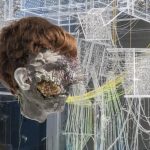
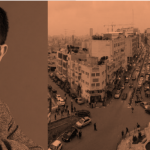
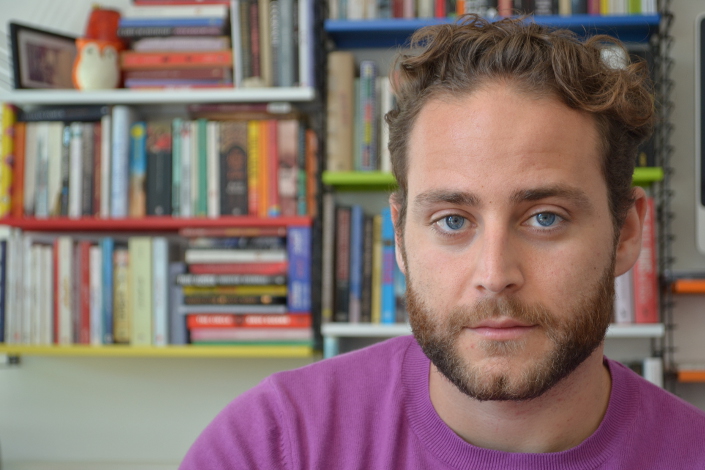
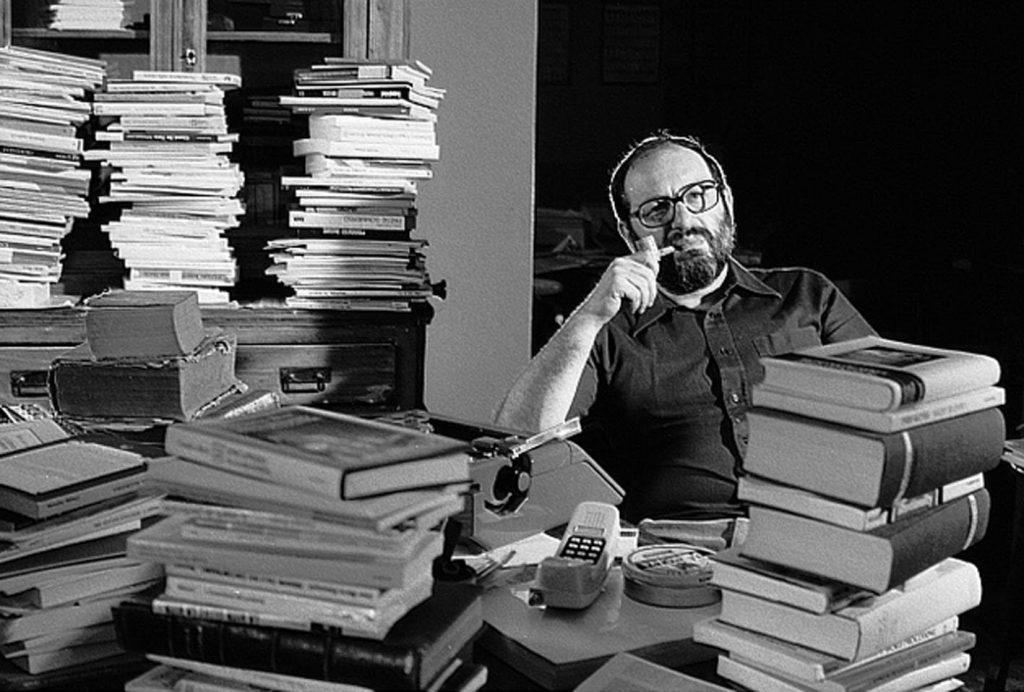
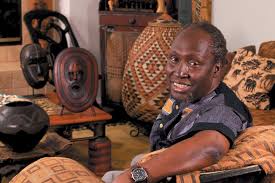

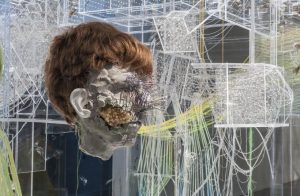
Rabaa / Alexander Jabbari
My Voice / Remah Jabr
My Name is Jbene